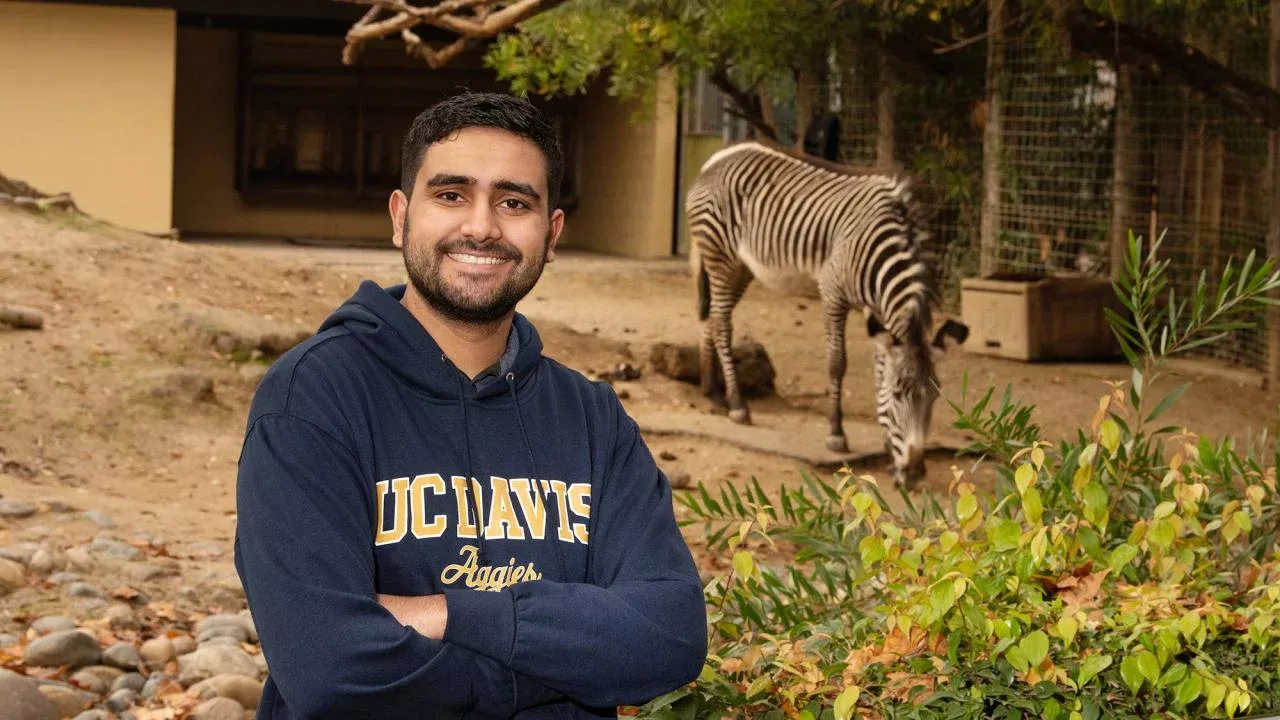
UC Davis Graduating Student Poised to Help Those With Rare Condition
Hundreds of Undergraduates to Attend Fall Commencement Saturday
“When you hear hoofbeats, think horses, not zebras.”
In medicine, this maxim recommends attributing symptoms to common conditions rather than rare ones.
Jeevan Mann of Yuba City, California, however, identifies as a zebra — someone with a rare genetic condition — and he is already working to help others like himself as he graduates from the University of California, Davis, Saturday.
He has conducted research related to his own condition, established a charitable organization, and studied for a career as a medical researcher and clinician.
“The care that I have been afforded — I know that’s not always the case,” Mann said. “Medical practitioners have greatly improved my quality of life. I want to be that medical practitioner for other people.”
Even through the chronic fatigue and pain associated with his Ehlers-Danlos syndrome, or EDS, the 20-year-old has completed a Bachelor of Science in psychology with an emphasis in biology just two and a half years after finishing high school. He will be among nearly 700 undergraduates participating in the 10 a.m. ceremony at the University Credit Union Center on campus.
Mann has the form of EDS identified by the AEBP1 gene. When he was diagnosed in 2022, medical literature could identify only 10 people with his specific condition. The connective tissue disorder is characterized by flexible joints causing pain and dislocation, fragile skin, poor wound healing, osteoporosis and more.
“EDS is really understudied,” Mann said. “That’s one of the problems we have. There are no treatments, cure or medications that can help.”
The journey to diagnosis
Mann was healthy until age 13. Repeated vomiting resulted in the discovery of a brain tumor that was causing hydrocephalus or excess water in the brain, for which he had surgery. As he developed arthritis in his joints, asthma, severe allergies and fatigue during high school, the quest for a diagnosis and help took his family to a geneticist at UC Davis Health, who identified two gene mutations.
In turn, a search for medical literature on the mutations led the family to a doctor in Florida who diagnosed Mann. That was during the fall of 2022 when Mann transferred to UC Davis from Yuba College in Yuba City.
Since his diagnosis, Mann has been a patient of the Special Care Clinic at Children’s Hospital Colorado, one of the few institutions in the country with EDS specialists. It is researching the disorder and treatments in collaboration with the Gates Institute and the University of Colorado School of Medicine.
Not often in the classroom at UC Davis, Mann has kept up with his courses through recorded lectures and receives accommodations for tests. He has taken an ambitious course load of 16 to 18 units each quarter and continued his studies through Summer Sessions.
“I had a lot of family support,” Mann said. “But part of me didn’t want to accept my diagnosis.”
From patient to research intern
Encouraged by his care team at the Colorado hospital to apply for an internship at the Gates Institute research lab, Mann spent this past summer surrounded by researchers helping develop novel therapeutics for EDS.
He worked on an experiment that used cells from EDS patients to grow skin samples for study. The lab is investigating the use of exosomes — secreted by most cells and present in tissues and body fluids — as a vehicle for therapeutic intervention.
“The internship studying my own disease was very important to me,” Mann said.
Mann’s gratitude for the medical care he has received has long inspired him to be a doctor. But after the internship, he shifted his focus to train to be a medical researcher and clinician. Now seeking a job to get more research experience, Mann said he hopes to start a joint program for a medical degree and doctorate in fall 2025.
Nonprofit to help others
Mann has recently founded Medical Inspiration, a nonprofit to help EDS patients and other chronically ill people find specialized care, provide financial assistance and advocate for them. Later, he hopes to fund research.
Mann has incorporated the organization and received 501(c)(3) status under the Internal Revenue Code, which exempts it from paying taxes and allows people to claim tax deductions on donations. As president, Mann has just launched a crowdfunding campaign.
